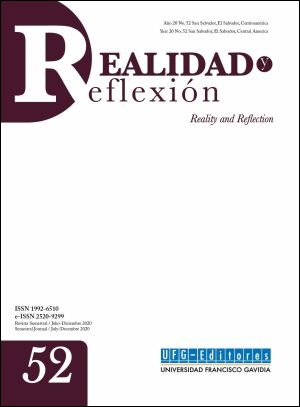Situational diagnosis of indigenous childhood and adolescence in El Salvador
DOI:
https://doi.org/10.5377/ryr.v52i52.10640Keywords:
Indigenous Peoples, Náhuat, Lenca, Kakawira, Human Rights, childhood, adolescence, worldviewAbstract
The purpose of the article is to promote the identification of material and spiritual conditions of life of the childhood and adolescence of the Náhuat, Lenca and Kakawira peoples; through their community experiences observed from the main areas of the reality of Indigenous Peoples, using the phenomenological qualitative methodology, through a bibliographic review and an analysis of content ethnological, historical, normative, public policy; as well as a description and understanding of phenomena from the worldview, principles, values and discourses of Indigenous Peoples.
The results established that, in the historical evolution, Indigenous Peoples suffered systematically and continuously violation of their fundamental and human rights, which led to the abolition of their culture, worldview, religion, denial of their institutions, health system, economic system, form of organization clothing, language and the violent dispossession of their lands; in addition to being historically denied their status as a subject of law, until their constitutional recognition with the reform of article sixty three.
The process of western alienation in which indigenous children and adolescents are immersed, jeopardizes the generational transfer of their worldview, due to the loss of identity and belonging; likewise, LEPINA empowers children and adolescents of their rights, without matching their obligations as a member of the community, violating the principles, values and worldview of the indigenous learning-teaching process; in reason of not promoting the key right of free, prior and informed consultation in the formulation of laws and public policies.
Downloads
655
Downloads
Published
How to Cite
Issue
Section
License
© Universidad Francisco Gavidia
Instituto de Ciencia, Tecnología e Innovación (ICTI)
Reality and Reflection
The content and opinions expressed in the publication are the responsibility of the authors of the published articles. The authors assign the publishing and publishing rights, in printed and digital version, to the Universidad Francisco Gavidia.
Proof of originality and assignment of publication rights
The authors must sign a certificate in which they indicate that the text presented for publication is original, unpublished and that it has not been sent for review in another academic publication; In turn, the authors assign the rights of publication and publication to Francisco Gavidia University. The format of this record will be sent through the emails: editores@ufg.edu.sv and jlozano@ufg.edu.sv
The journal Reality and Reflection is housed in the institutional dissemination platforms (web page and in the repository), as well as in databases and other pages of scientific dissemination. The publications of the Francisco Gavidia University are subject to the Salvadoran copyright law, contemplated in the Intellectual Property Law https://www.asamblea.gob.sv/
The content of the work is the sole responsibility of the author, therefore, if for any reason or reason, direct or indirect, the Editor is obliged to pay any compensation to a third party derived from the work of the author, whether it is established in a transaction, agreement or final or enforceable judicial sentence, the Editor may repeat against the Author for the total amount of compensation, plus adjustments, interests and costs that correspond.
It will be the obligation of the UFG to grant five copies of the publication which will be delivered at the UFG Editores headquarters in San Salvador.

